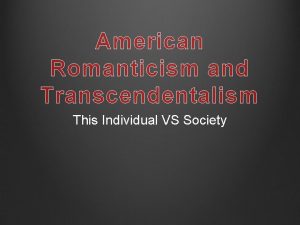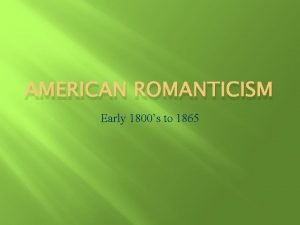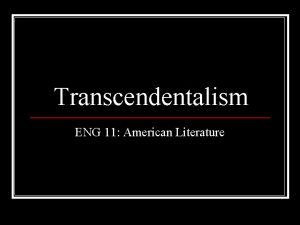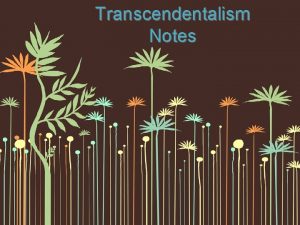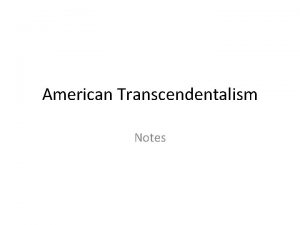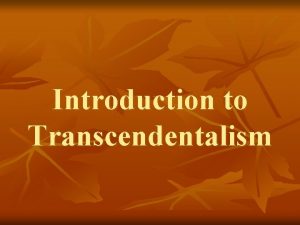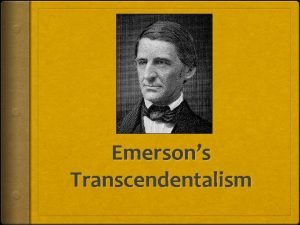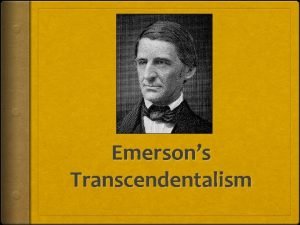Transcendentalism Transcendentalism is an American literary political and





- Slides: 5

Transcendentalism • Transcendentalism is an American literary, political, and philosophical movement of the early nineteenth century, centered around Ralph Waldo Emerson. • Other important transcendentalists were Henry David Thoreau, Margaret Fuller, Amos Bronson Alcott, Frederic Henry Hedge, and Theodore Parker. • They were critics of their contemporary society for its unthinking conformity, and urged that each person find, in Emerson's words, “an original relation to the universe” (O, 3). • Emerson and Thoreau sought this relation in solitude amidst nature, and in their writing. – Valuing nature over society was big to transcendentalist ideas! • By the 1840 s they, along with other transcendentalists, were engaged in the social experiments of Brook Farm, Fruitlands, and Walden; and, by the 1850 s in an increasingly urgent critique of American slavery.

Ralph Waldo Emerson Self- Reliance (1841) Background § Born in 1803, the son of a conservative Unitarian minister. § Father died when he was eight, leaving family in meager circumstances. § Influenced by an eccentric aunt, who encouraged his education and broadminded thinking. § Attended Harvard at age 14, graduating at 18 and working as a schoolmaster before studying theology. § Ordained as junior pastor of Boston’s Second Church (1829) where Cotton and Increase Mather preached more than a century before. § Married Ellen Tucker who died of tuberculosis sixteen months later. § Resigned his pastorate in 1832, because of his skepticism with theological doctrines such as the Lord’s Supper. § Traveled to Europe meeting well-known writers, Coleridge, William Wordsworth, and Thomas Carlyle. § Moved to Concord, Massachusetts, began lecturing and writing. § Married Lydia Jackson; fathered four children. His first born, Waldo, died in 1842 at age 5.

Ralph Waldo Emerson Self- Reliance (1841) Additional Background § Believed in individualism, non-conformity, and the need for harmony between man and nature. A proponent of abolition. § His first book, Nature (1836), influenced by a range of idealistic philosophies, confirmed his future as a prose writer -- establishing him as the center of the Transcendental Movement. § Self Reliance is his most famous collection of essays. These essays were § Contributed to the Transcendentalists’ magazine, The Dial, serving as editor from 1842 -1844. § Known as a key figure in the “New England Renaissance” [helping American Literature find it’s place in world literature]. § Gained recognition for his poetry [collected in 1846]. § An inspiration for many writers, especially Henry Thoreau and Walt Whitman. gathered from his journals and lectures and covered a period of years. The earliest essay from 1832, the year he left the pulpit.

Based on your knowledge so far… At the top of your page, complete three sentences… (write the ENTIRE) sentence: 1. Based on my knowledge of transcendentalism and Emerson, I believe that thesis of “Self-Reliance” will be… 2. I believe this because… 3. I will know that my prediction is true if the text contains the following elements, claims, or ideas:

As we read, CIRCLE words that are unfamiliar to you! LET’S READ!
